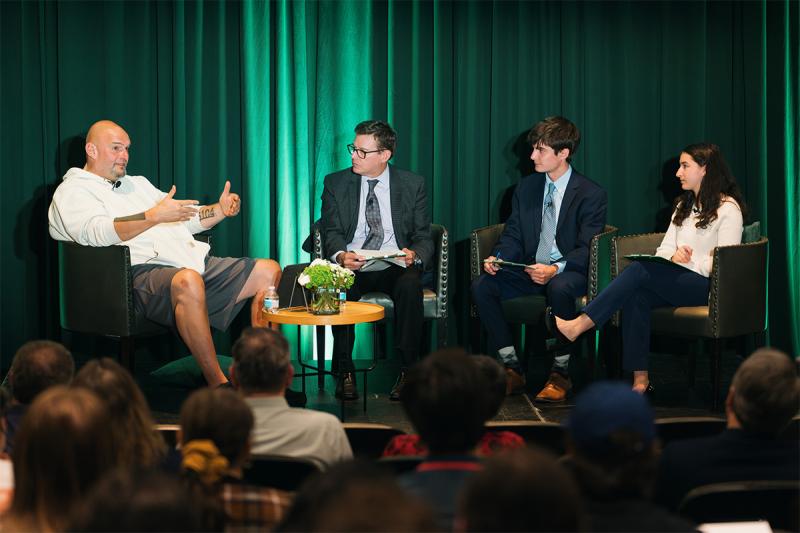The need for collaboration between the public and private sectors has never been more crucial, according to Clinical Professor Charles Wheelan D’88.
Wheelan was recently named faculty director of Tuck’s Center for Business, Government, and Society whose mission is to “empower business leaders to navigate immediate stakeholder interests and the broader, deeply intertwined interests of both governments and society to help build a more sustainable global economy and contribute to the common good.”
With a background that spans academia, journalism, and public policy, Wheelan brings a unique perspective to his role at the Center. Prior to Tuck, Wheelan was senior lecturer and policy fellow at Dartmouth’s Rockefeller Center for Public Policy. A longtime correspondent for The Economist, he is also author of the Naked series, including Naked Economics, Naked Money, and Naked Statistics. Most recently, he contributed to The Center Must Hold alongside Tony Blair, Michael Bloomberg, Kathryn Murdoch, and others. The book explores why centrism may be the most effective antidote to the extremism that dominates the current political climate.
At Tuck, Wheelan teaches the elective The Future of Capitalism in the MBA program and Economics in the Tuck Business Bridge Program. He co-leads the Tuck Dialogues initiative with Dia Draper, assistant dean for diversity, equity, and inclusion, and Vincent Mack, director of intercultural leadership. This winter, he is also leading a Tuck Global Insight Expedition to Argentina where MBA students will spend time with senior business and government leaders to explore the country’s social and economic policies and business opportunities.
In a conversation, Wheelan shares more on the Center, the opportunities and challenges that arise when business and government collaborate, and the importance of fostering diverse perspectives and constructive dialogue.

Tuck's Charles Wheelan D’88 recently moderated a discussion with U.S. Sen. John Fetterman during Dartmouth’s 2024 Election Speaker Series. | Photo by Eli Burakian
You were recently named faculty director of Tuck’s Center for Business, Government & Society. Talk to me about the center’s mission and why it matters more than ever.
Many of society’s most pressing issues sit at the intersection of business and government, with climate change being a prime example. Businesses contribute to the problem, but they must also play a central role in the solution. Other related issues, such as good governance and election reform, no longer fit neatly in the bucket of the private sector or the public sector. Instead, there’s this melding of the two.
The COVID-19 pandemic is a good example of this. There was a huge public policy response. On the other hand, the vaccine was a remarkable partnership between the government and the private sector. The drug delivery process can take decades, so Project Warp Speed, which was run out of the White House, was designed to speed it up. The government alone could not have achieved this, and while the private sector might have managed it independently, the process would have taken far longer. There needs to be collaboration between the two.
I would love for Tuck students to play an important role in encouraging collaboration between the private and public sectors. By highlighting the potential impact of private sector involvement in public sector challenges, and advocating for the utilization of public-private partnerships and entrepreneurial approaches, we can pursue innovative solutions to complex societal issues.
What are some other examples where you’d like to see more collaboration between organizations, businesses, or even individuals?
Sustainability efforts. Sustainability can only be achieved by an effective collaboration between the government and the private sector. We’ve seen why a lot of these sustainability efforts on the private side fail, either because they weren’t substantive enough, or they were simply greenwashing. The incentives weren’t right. There must be strong government incentives to set clear standards for sustainability, alongside complementary private sector initiatives that align with these goals. Without both forces working together, sustainability efforts are likely to fall short.
Another example is infrastructure reform. All kinds of things can be done here, from replacing bridges (Baltimore being an example), to installing more EV chargers. These projects serve a public purpose, but there’s no reason why the government couldn’t use private sector resources to speed up the construction of these projects.
Tuck Dialogues, which you co-lead at Tuck, is an initiative created to help students foster constructive dialogue and navigate hard conversations. Why is this a crucial skillset for tomorrow’s leaders?
It matters at multiple levels. It matters because we cannot do what we need to do as an institution of higher education if people in the classroom, faculty, or students don’t feel like they can share their views.
Feedback from firms, employers, and alumni indicates that navigating uncomfortable conversations is more challenging now than in the past. How can you possibly discuss an issue as complex as race, poverty, or substance addiction if half the people in the room are like, “Well, I wish we could say, but I can’t.”
Around the country, we have reached this place where we have lost our ability to harness disagreement. Disagreement will always be there, so we need to learn to channel it in a way that leads to a constructive outcome. That is the essence of governance in a democracy. It’s not that we all have to agree. It’s that we all have to take our honest disagreements and make something good out of them.
Disagreement will always be there, so we need to learn to channel it in a way that leads to a constructive outcome. That is the essence of governance in a democracy. It’s not that we all have to agree. It’s that we all have to take our honest disagreements and make something good out of them.
— Charles Wheelan D’88
You’ve led global experiential learning treks around the world, and I know you plan to lead a Tuck Global Insight Expedition to Argentina in winter 2025. Why does experiential learning matter?
During a trip to South Africa, we passed Eskom, the national power company, where the electricity was out both in the building and across the surrounding block. I suspect that every student on that trip will remember that moment 50 years from now. It was a stark demonstration of how inequity manifests itself: while the power was out for everyone, our hotel could afford a generator.
That experience just underscores this idea that good governance matters, and it’s hard.
Tuck’s mission is to develop wise, decisive leaders who better the world through business. How do you see the Center’s role in this, and why is this so important?
I would love every person in the Tuck community, but particularly the Center fellows, to appreciate that they will not be able to live a secure, prosperous life if they don’t simultaneously tend to make government work better for everybody. I would say that my generation neglected governance, a lot of social equity issues, and overall making democracy work well. The looming environmental challenges are a whole host of public-facing challenges that we did not address as a generation.
I want people to understand that the public sector and the private sector are not unique, distinctive buckets—they are inextricably linked. There are a whole host of tools that we traditionally think of as belonging to the private sector (i.e. being an entrepreneur, creating a startup, raising capital) that can also be used in the public sector to solve public challenges.
All of Tuck’s programs are in service of one consistent mission which is creating wise, decisive leaders. I’d like all those wise, decisive leaders to think as broadly as possible about society.

